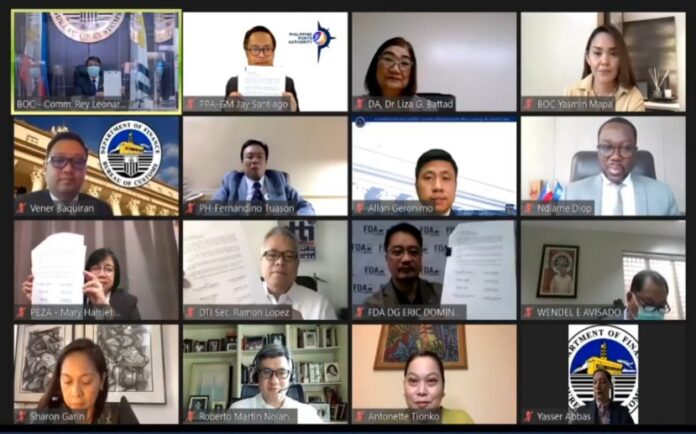
-
The Bureau of Customs officially launched on March 26 the Philippines Customs Modernization Project (PCMP)
-
Projects seeks to achieve global standard and fully modernized customs operations by 2024
-
A steering committee will be created to lead the PCMP implementation and address the need to upgrade and standardize BOC’s ICT systems, operational networks, and organizational structure
-
World Bank country director Ndiamé Diop said PCMP aims to “propel the Philippines Customs administration to the global frontier of best practices”
The Bureau of Customs (BOC) has officially launched the Philippines Customs Modernization Project (PCMP), with an eye toward achieving global standards and full modernization by 2024.
At the virtual launch of the project on March 26, a joint memorandum circular (JMC) was also signed creating a steering committee that will lead PCMP’s implementation.
“Supported by the World Bank (WB) and in line with the standards of the Revised Kyoto Convention and the World Trade Organization’s Trade Facilitation Agreement, the Bureau of Customs is eyeing to achieve global standards and full modernization by 2024, gearing towards an effective and efficient customs administration,” Customs commissioner Rey Leonardo Guerrero said during the event.
First introduced by WB in 2017, the PCMP is expected to improve the country’s customs administration through streamlining, automation, and development of a world-class customs processing system (CPS).
The project has a total cost of US$104.38 million, of which $88.28 million will be funded through WB’s official development assistance and the balance shouldered by the borrower. The WB Board finally approved in October 2020 the $88 million loan for the project.
READ: World Bank approves $88M loan for BOC modernization project
Guerrero said international standards have not been met because opportunities for corrupt practices were present and needs were not being met. These unmet needs are related to old and outdated ICT systems, inadequate office accommodation and access to the proper physical resources, and the proper and proactive mechanisms to dialogue and interact with customs stakeholders.
He said the PCMP will address “the urgent need of the Bureau of Customs to upgrade, expand and standardize our ICT systems, operational networks, and organizational structure.”
The project’s technical design forms an interlocking set of reforms to address the issues and challenges BOC faces, with focus on automation to improve the bureau’s processes and integrated systems.
WB country director Ndiamé Diop said at the launch that PCMP aims to “propel the Philippines Customs administration to the global frontier of best practices.”
He noted that the CPS in particular will streamline and rationalize processes and procedures, and “will be a very significant upgrade from the current Electronic-to-Mobile System launched in 2005.”
“The automation of processes by the CPS will increase accountability, reduce a significant amount of face-to-face interactions, and reduce delays at the border,” Diop noted.
Delivery of three Rs expected
Once completed, the project is expected to deliver “on three much needed ‘Rs’ in the post-COVID-19 environment,” said Diop. These are revenue, resilience, and recovery.
PCMP is expected to create a simplified, faster, and more user-friendly experience for compliant traders, with the CPS supporting enhanced intelligence in targeting and discovering high risk cargo as well as compliant traders. This is expected to expand the country’s tax and duty base and “lead to an in increase in government revenue without implementing additional taxes.”
Diop noted that similar customs reforms projects by the WB in other countries have led to an actual increase in revenue collection of between 11% and 300%.
The COVID-19 pandemic also highlighted the urgent need for trade facilitation reforms to keep critical goods flowing. Diop said the PCMP will also further streamline customs and border agency procedures and make BOC and the trading community more resilient to future supply chain disruptions.
Diop said removing administrative and regulatory bottlenecks at borders “can have powerful effects on reducing trade costs, enhancing the country’s competitiveness, and supporting economic recovery.”
He noted that research undertaken by the WB, Organisation for Economic Co-operation and Development, and WTO “strongly suggests that Customs and other border delays are now more of a significant impediment to trade than tariff.”
“With improved speed and predictability of trade clearances, the economic competitiveness of the Philippines can be greatly enhanced and this will make the Philippines far more attractive to investors,” Diop said.
He noted, as an example, a similar WB project in Russia which significantly reduced clearance times from 10 days to just one.
While citing benefits, Diop also pointed out that “securing the benefit of this project requires steady commitment and hard work.”
Project steering committee
He said WB’s experience suggests that to succeed, the project will need stakeholders who are fully committed and willing to work together to overcome the challenges of the project’s implementation.
He noted the need to create a project steering committee to guide the project’s implementation.
BOC assistant commissioner Atty. Vincent Philip Maronilla, in a text message to PortCalls, said the JMC signed during the virtual launching creates the project steering committee, to be chaired by the Finance secretary and composed of other agencies critical to the operations of BOC.
“Its main task is to provide policy guidelines for the implementation of the Customs Modernization Project,” Maronilla said.
Aside from the project steering committee, BOC earlier established a project management unit responsible for overall project implementation and formed a special bids and awards committee on the procurement of the different project components.
READ: BOC bids out P240M consulting services for modernization project
Early this year, BOC started the bidding for consulting firms that can assist in all aspects of PCMP implementation. – Roumina Pablo




